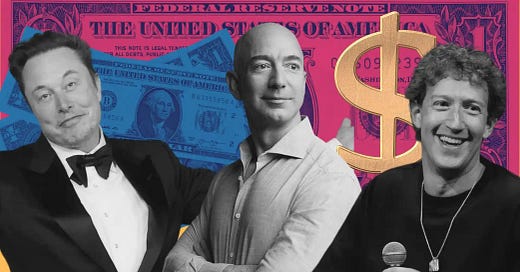Tech’s Gilded Age: A Tipping Point
From Unicorns to Inequality (and What We Need to Do About It)
Ok, let’s talk about the digital age. It’s supposed to be this utopian future, right? Connecting us all, democratizing information, unleashing human potential. And, in many ways, it has. But let’s be honest, it’s also become a freakin’ petri dish for wealth inequality, a system rigged in favor of a handful of companies and their demi-god founders.
We’ve got this absurd situation where a few dudes in hoodies control more wealth than entire nations. These aren't just companies; they’re quasi-national entities, wielding unprecedented power over our information, our commerce, and increasingly, our politics. And while they’re busy launching rockets into space and building metaverses nobody asked for, the rest of America is getting screwed. They’ve brought their own social awkwardness issues into our every day lives and are shaping who we are and how we live. This is not what we envisioned when Hi Tech began in the 80’s. We are now at the mercy of a few screwed up dudes who live for power and money and not much else.
Let’s break it down, because this isn’t complicated:
Automation is eating jobs alive. It’s not just blue-collar work anymore. AI is coming for the white-collar gigs too. Think about it: truck drivers, customer service reps, even some lawyers. These jobs are vanishing, and the people who held them are getting left behind. If not AI itself, it will be those who don’t know how to use AI. The result? A barbell-shaped economy: a few at the top, a growing mass at the bottom, and a shrinking middle.
Network effects are creating monopolies. These platforms aren't just connecting us; they're sucking up all the oxygen in the market. The bigger they get, the more valuable they become, creating an almost insurmountable barrier to entry for competitors. It’s a winner-takes-all scenario, and the winners are taking everything.
The digital divide is widening the gap. Access to broadband isn't a luxury anymore; it's a necessity. But millions of Americans, particularly in rural areas and low-income communities, are still left on the wrong side of the digital divide. This lack of access further entrenches existing inequalities.
Data is the new oil, and these guys are the new Rockefellers. They’re hoovering up our data, packaging it, and selling it back to us in the form of targeted ads. It’s surveillance capitalism at its finest, and it’s making them obscenely rich while eroding our privacy.
This isn’t some abstract economic theory; this is affecting real people’s lives. We’re creating a society where the top 10% are living in a different reality than the rest of us. It’s not sustainable, and it’s not just.
So, what can we do about it? We need to get serious, people. This isn’t a problem that’s going to fix itself. All of us, the 90%’ers, ALL of us seem to be starting to agree on this.
Here’s some ideas:
Invest in education and retraining. We need to equip people with the skills they need to thrive in the 21st-century economy. This means focusing on STEM education, digital literacy, and retraining programs for displaced workers. It means valuing all crafts not just just Digital jobs, and bringing these crafts into the digital century.
Break up the monopolies. These companies have become too powerful. It’s time to dust off the antitrust playbook and start breaking them up.
Regulate data privacy. We need strong data privacy laws that give individuals control over their personal information and hold companies accountable for how they use it.
Tax these companies appropriately. They’re making billions off our data and infrastructure. It’s time they paid their fair share.
This isn’t about being anti-technology; I’ve been in this field a long time, it’s about ensuring that technology serves humanity, not the other way around. We need to reclaim control of our digital future before it’s too late. This isn’t a drill, people. This is our moment.






